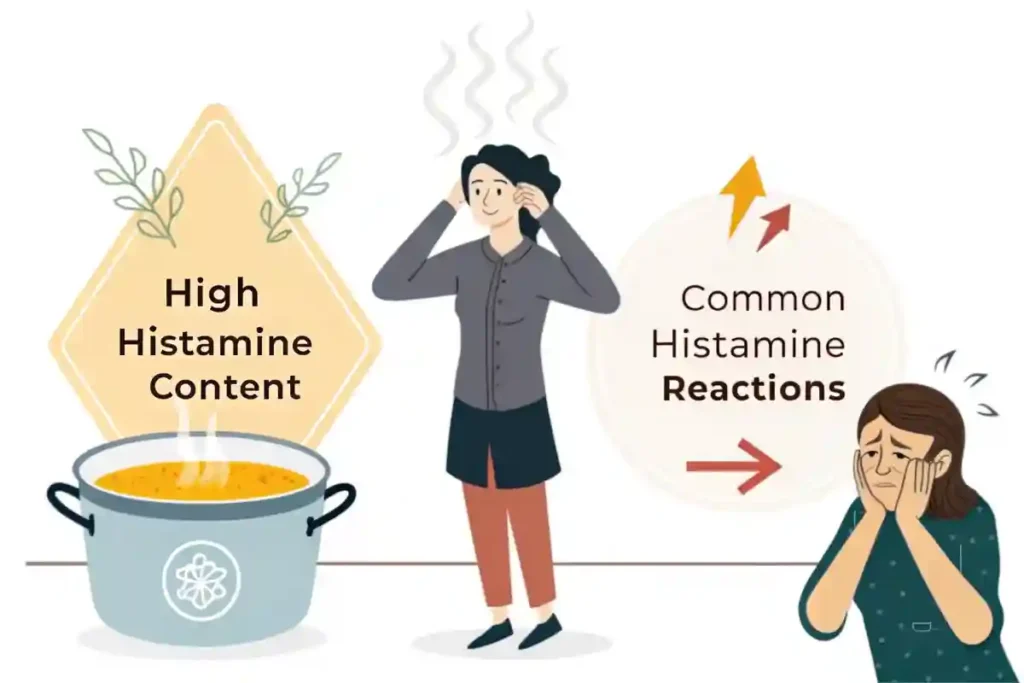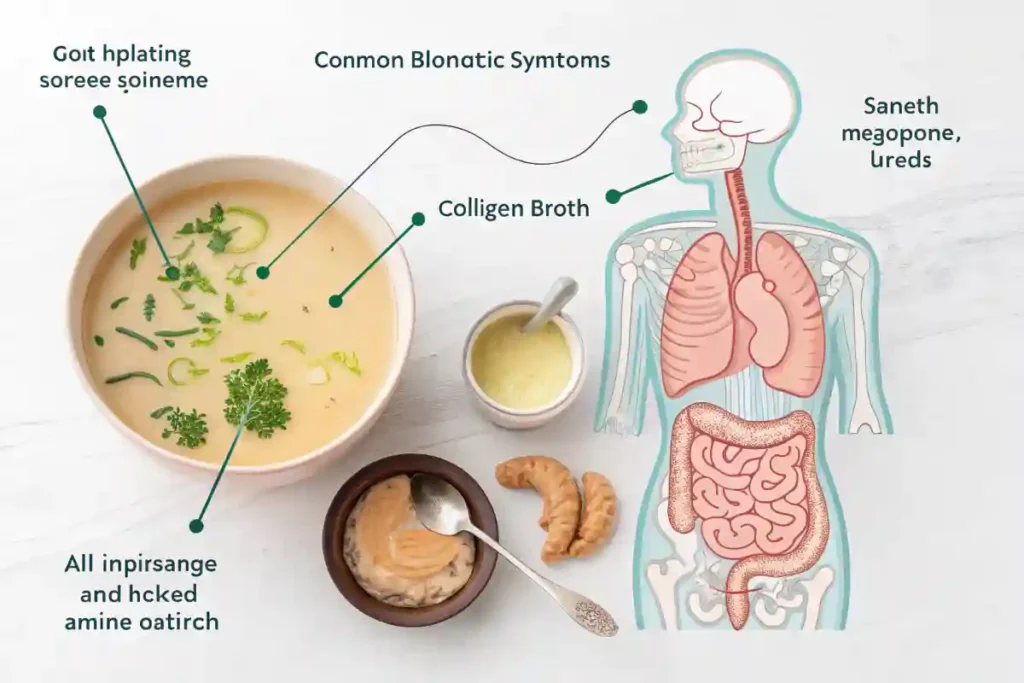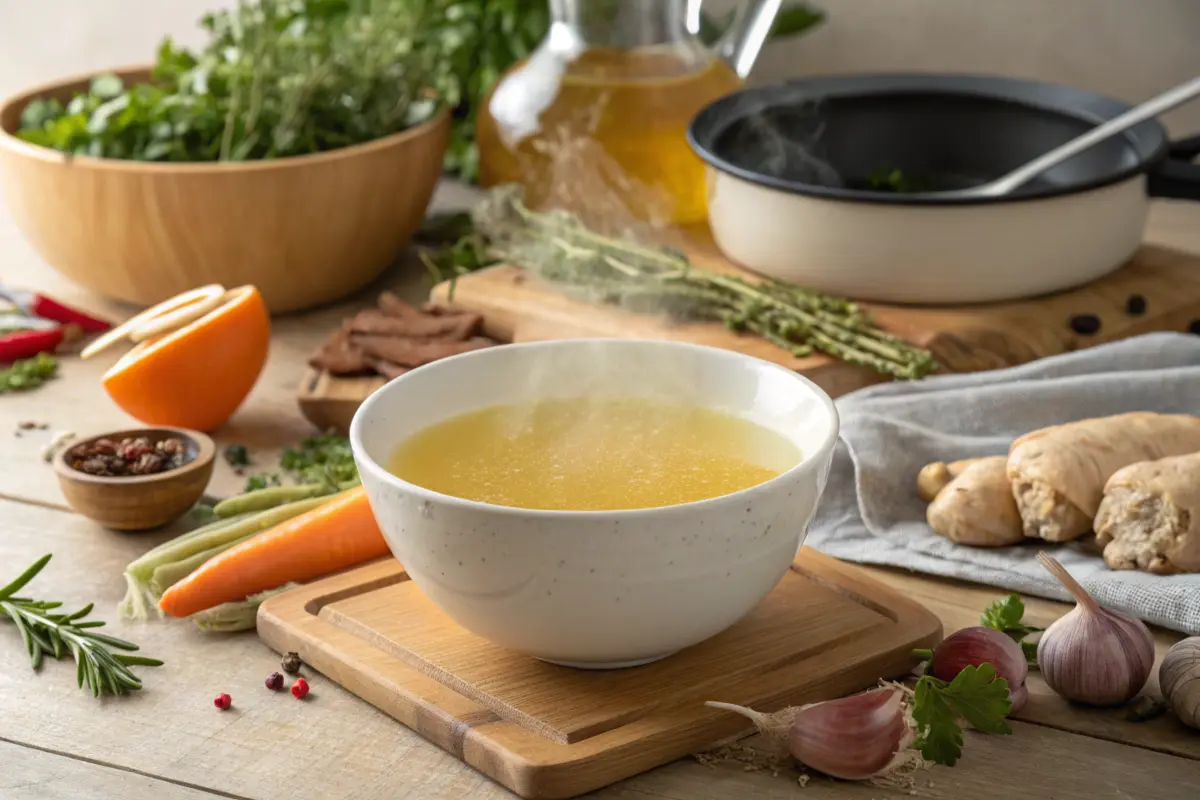Bone broth has made waves as a nutritional powerhouse, packed with health benefits ranging from better gut health to glowing skin. But for some, this seemingly magical elixir causes unexpected discomfort. If you’ve ever asked yourself, “Why do I feel weird after drinking bone broth?”, you’re not alone. In this article, we’ll explore why these reactions happen and how to address them, delving into gut health, histamine intolerance, and practical solutions to help you enjoy bone broth without the side effects.
The Rising Popularity of Bone Broth
The Superfood Narrative
Bone broth is more than a passing trend—it’s a revival of age-old wisdom. For centuries, this savory liquid, made by simmering animal bones and connective tissues, has been a cornerstone in traditional diets worldwide. From your grandma’s kitchen to modern wellness blogs, bone broth has been celebrated for its gut-healing and nourishing properties.
Today, it’s often labeled a superfood, thanks to its supposed ability to improve everything from joint health to immune resilience. Influencers and health gurus tout it as a cure-all for modern ailments, but as we’ll discover, not every experience with bone broth is sunshine and rainbows.
Nutritional Composition
What makes bone broth such a big deal? Its nutritional content is the real MVP. Bone broth is loaded with:
- Collagen: This protein is the backbone of healthy skin, joints, and connective tissues.
- Gelatin: A more bioavailable form of collagen, gelatin supports digestion and skin health.
- Amino Acids: Glycine and glutamine help with liver detoxification and gut repair.
- Essential Minerals: Magnesium, calcium, phosphorus, and more provide a host of metabolic benefits.
These nutrients combine to create a broth brimming with health potential. However, this same richness can sometimes overwhelm sensitive systems, leaving some people feeling bloated, foggy, or just plain “off.”
Common Side Effects After Consuming Bone Broth
Gastrointestinal Discomfort
For some people, sipping on bone broth can lead to uncomfortable side effects. The most common complaints include bloating, gas, and stomach cramps. These issues might leave you scratching your head and asking, “Why do I feel weird after drinking bone broth?”
One reason for these symptoms is the high concentration of amino acids, such as glutamine, found in bone broth. While these compounds are gut-friendly for many, they can cause a temporary imbalance in individuals with sensitive digestive systems. Additionally, bone broth’s richness may overwhelm those with impaired digestion or existing gastrointestinal conditions, leading to discomfort.
Systemic Reactions
Bone broth reactions aren’t limited to your stomach. Symptoms like brain fog, fatigue, and even skin irritation are often linked to consuming it. The culprit behind these issues might be histamine, a compound released during the long cooking process of bone broth. Histamine can trigger various symptoms, particularly in individuals with histamine intolerance, which we’ll explore further in Part 3.
If these side effects sound familiar, don’t fret. These reactions are usually temporary and often indicate underlying issues that need addressing, rather than a problem with the broth itself.
Histamine Intolerance: A Major Culprit

What Is Histamine Intolerance?
Histamine intolerance occurs when your body struggles to break down histamine efficiently. This compound, naturally present in your body and certain foods, helps regulate bodily functions. However, when histamine accumulates, it can lead to symptoms like itching, headaches, and digestive distress.
Bone broth, due to its extended simmering process, becomes a high-histamine food. If you’ve wondered, “Why do I feel weird after drinking bone broth?”, the answer might lie in how your body processes this compound.
High Histamine Foods and Bone Broth

Bone broth isn’t the only food packed with histamine. Fermented foods like kimchi, aged cheeses, and even leftovers can be high in histamine. Consuming these alongside bone broth can exacerbate symptoms, especially for those with histamine sensitivity.
Here’s why: Histamine is heat-stable, meaning cooking or reheating won’t reduce its levels. The longer the broth simmers, the more histamine it contains. This can spell trouble for individuals with low diamine oxidase (DAO) enzyme levels, which are responsible for breaking down histamine in the body.
Underlying Causes of Reactions to Bone Broth
Gut Health as the Foundation

The gut plays a starring role in how your body reacts to bone broth. If you’ve ever thought, “Why do I feel weird after drinking bone broth?”, it’s worth considering the health of your microbiome. The gut contains trillions of bacteria that work together to maintain balance, but when this harmony is disrupted—known as dysbiosis—it can lead to inflammation and discomfort.
Bone broth is rich in gut-healing nutrients like collagen and glutamine, but for individuals with leaky gut syndrome, these compounds can initially irritate the intestinal lining. Similarly, the broth’s amino acids might trigger bloating or cramping in those with sensitive digestion.
Individual Variability
No two bodies are alike, and your reaction to bone broth may hinge on several unique factors. Some people have lower levels of digestive enzymes like diamine oxidase (DAO) or histamine N-methyltransferase (HNMT), which are crucial for breaking down histamine and other compounds found in bone broth.
Additionally, pre-existing conditions such as irritable bowel syndrome (IBS) or small intestinal bacterial overgrowth (SIBO) can amplify negative reactions. These conditions make it harder for the body to process the nutrient-dense properties of bone broth, leading to symptoms like gas, fatigue, and even brain fog.
Pro tip: For more helpful tips on managing gut-related discomfort, check out our article on Chicken Bone Broth Recipes.
Managing and Preventing Adverse Reactions
Immediate Strategies
If bone broth makes you feel “off,” a few simple tweaks can help. Start by modifying how you prepare it. Opt for shorter cooking times, such as making meat broth instead of bone broth, to reduce histamine buildup. Unlike bone broth, meat broth simmers for only a few hours, minimizing the risk of triggering histamine sensitivity.
Another trick is to consume smaller portions. Instead of a full cup, try a few sips to test your body’s tolerance. Pairing the broth with low-histamine foods can also reduce the overall histamine load on your body.
Long-Term Solutions
Healing your gut is key to enjoying bone broth without side effects. Start by focusing on a gut-friendly diet, rich in whole, unprocessed foods, probiotics, and prebiotics. These steps help balance the microbiome and reduce inflammation over time.
Supplements, such as DAO enzymes, can assist in breaking down histamine during meals. Consult a healthcare provider to explore whether supplements or gut-healing protocols, like reducing SIBO or addressing leaky gut, are right for you.
For more comforting recipes to pair with your healing journey, explore our collection of Chicken and Potato Recipes.
Frequently Asked Questions (FAQs)
What Are the Signs of Histamine Intolerance from Bone Broth?
One of the most common reasons people ask, “Why do I feel weird after drinking bone broth?”, is due to histamine intolerance. Symptoms can vary but often include bloating, stomach cramps, or skin reactions like itching or redness. You might also experience brain fog or fatigue after consuming high-histamine foods like bone broth.
How Can I Test for Histamine Intolerance?
If you suspect histamine intolerance, start by tracking your reactions to foods high in histamine, including bone broth, aged cheeses, and fermented items. Consult a healthcare professional for more detailed testing, such as blood tests for diamine oxidase (DAO) levels or elimination diets to identify specific triggers.
Can Bone Broth Be Made Low in Histamine?
Yes! To reduce histamine levels, try making meat broth instead of bone broth. Meat broth simmers for 2-3 hours, significantly lowering histamine content compared to the 24-72 hours typically required for bone broth. Always consume broth fresh or freeze it immediately to prevent histamine buildup.
What Are the Best Alternatives to Bone Broth?
If bone broth doesn’t work for you, meat broth or vegetable broth can be great alternatives. These options provide many of the same benefits without triggering histamine intolerance or digestive discomfort. For more options, consider herbal teas or collagen supplements as gentler sources of nourishment.
Conclusion and Final Thoughts
Bone broth has earned its reputation as a nutritional powerhouse, but it’s not without its challenges. For those who have asked, “Why do I feel weird after drinking bone broth?”, understanding the underlying causes can make all the difference. Whether it’s histamine intolerance, gut health issues, or individual variability, the key lies in identifying what works for your unique body.
The good news is that discomfort doesn’t have to mean saying goodbye to bone broth forever. By adjusting preparation methods, consuming it in smaller portions, or exploring alternatives like meat broth, you can still enjoy the benefits without the side effects. Long-term strategies, including improving gut health, can pave the way for a more balanced relationship with this beloved “superfood.”
As you navigate your wellness journey, remember that what works for others may not work for you—and that’s okay. Listen to your body, and don’t hesitate to experiment with different approaches. Your perfect balance is just a few sips away!
Practical Tips for Enjoying Bone Broth Safely
Adjusting Cooking Methods

One of the simplest ways to reduce discomfort is by tweaking how you prepare bone broth. If you’ve ever wondered, “Why do I feel weird after drinking bone broth?”, the solution might lie in the cooking process. Opt for shorter simmering times to limit the formation of histamines and other compounds that can irritate your system.
For instance, instead of simmering bones for 24-72 hours, try cooking them for 4-6 hours. You’ll still get many nutrients without the excess histamines. Using fresh, high-quality ingredients and consuming the broth immediately after preparation can also minimize the risk of triggering unwanted reactions.
Pairing Bone Broth with Complementary Foods
What you eat with bone broth can significantly impact how your body reacts. Pair it with low-histamine foods like fresh fruits and vegetables to balance the overall histamine load. Additionally, avoiding other high-histamine items, such as aged cheeses or fermented foods, on the same day can help reduce the likelihood of symptoms.
Small portions are another game-changer. Start with half a cup and gradually increase your intake as your body adjusts. These small changes can help you enjoy bone broth without feeling overwhelmed by its richness.
Personalized Solutions for Better Results
Listening to Your Body
Everyone’s body reacts differently to bone broth. While it’s hailed as a gut-healing superfood, it’s essential to monitor how it makes you feel. If you notice recurring discomfort and keep asking yourself, “Why do I feel weird after drinking bone broth?”, consider keeping a food diary to track symptoms and identify patterns.
Some people may benefit from consulting a healthcare provider or nutritionist to pinpoint specific sensitivities. Testing for histamine intolerance, SIBO, or other gut-related issues can provide a clearer picture of what’s happening in your body.
Exploring Alternative Solutions
If bone broth consistently triggers symptoms, explore alternatives that deliver similar benefits. Meat broth, as mentioned earlier, is a gentler option with fewer histamines. Vegetable broth, packed with essential minerals and antioxidants, is another excellent choice for those who want to avoid animal products.
Collagen supplements and amino acid powders can also offer the benefits of bone broth in a more controlled form. These solutions allow you to tailor your intake without risking the discomfort associated with high-histamine foods.

